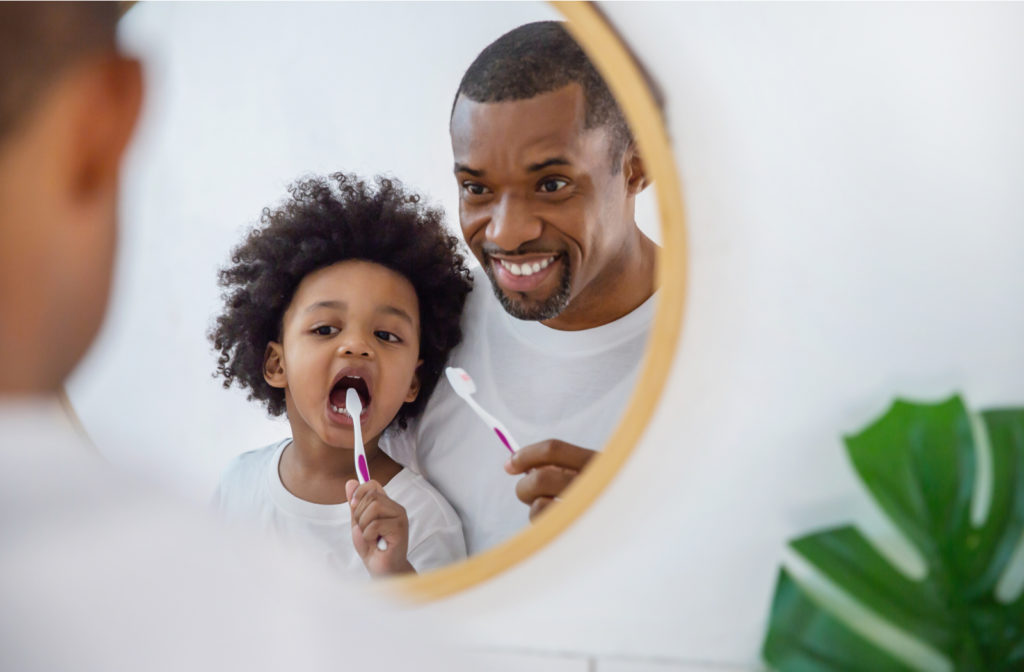
Great news: there’s no rigid schedule when it comes to losing baby teeth, and each child grows and develops on their own schedule. Typically by kindergarten, children will start to lose their teeth. Usually there is no pain involved, but there may be a bit of tenderness in the gums after the tooth falls out. Keeping the area clean is important. Parents should help their children with gentle brushing.
Every Child’s Smile is Unique
Some babies start walking before they’re 1 year old, and some don’t take their first steps until they’re 18 months old. Every child is different, and that goes for their smiles too!
Parents love celebrating their child’s milestones. These are memorable moments and the dentist can help to make one of those milestones even more special. Losing the first tooth can be a thrilling moment for a child and their parents. We are happy to chat with you about questions you may have about your child’s smile anytime.
Tooth Fairy in the House!
Starting as early as kindergarten, a child can begin to lose their teeth. Typically, this is when the dentist will start texting the tooth fairy to share this exciting news. Some children start losing teeth earlier and some may be a bit later, but eventually, all 20 baby teeth will fall out by age 13. There are some times when baby teeth do not fall out. The paediatric dentist can discuss options with you.
When children start losing teeth, a visit from the tooth fairy is inevitable. The tooth fairy may be very generous with money under the pillow at night, or maybe books on the night table, or leave another type of special treat. No matter what the tradition, it’s a fun way to celebrate a big moment in a young child’s life. No matter what surprise is waiting the following day, children love speculating about what the tooth fairy does with all those baby teeth they collect!
Permanent (adult) Teeth
Baby teeth are placeholders in the jaw for future, permanent teeth.
Remember: First in, first out. This simple rule means we can expect our children to lose their primary teeth in the order they arrive.
When your child has a permanent tooth that’s about to erupt, the baby tooth’s root begins to dissolve. Once the root has dissolved, then the tooth becomes loose, because it’s only held in place by the surrounding gum tissues.
If your child’s baby tooth is loose, it’s okay if they want to wiggle it. However, never use force to pull out a tooth if it’s not ready.
You can expect your children to lose their primary teeth between the ages of 6 and 12, and to have 28 permanent adult teeth by their teenage years. If the third molars (wisdom teeth) come in, then your child will have a total of 32 teeth heading into adulthood.
If your child has not lost their first tooth by 8 years old, or if you notice a permanent tooth arriving before the baby tooth has fallen out, you may consider making an appointment with your dentist. They can assess your child and have a discussion regarding their findings.

The No-Pressure Timeline
It’s essential to note that the timelines we’re sharing with you today are general guidelines. If your child’s teeth appeared quickly, odds are they will lose them earlier. Alternatively, if your child’s teeth arrived more slowly, then their adult teeth may take longer to come in.
If you’re concerned about your child missing important dental milestones, it’s best to speak with your dentist directly. They will have a better idea of what’s happening with your child’s dental health.
Here is a general timeline of when you can expect your child to begin losing their baby teeth:
- Upper and lower central incisors: You can expect these primary teeth to come out between 6 and 7 years old
- Upper and lower lateral incisors: These primary teeth usually come out between 7 and 8 years old
- Upper and lower first molars: These teeth are generally lost between 9 and 11 years old
- Lower canines: Typically lost between 9 and 12 years old
- Upper canines: Mostly lost between 10 and 12 years old
- Lower and upper second molars: Generally lost between 10 and 12 years old
Losing a Tooth
In the beginning, your child may experience a range of emotions. They may be super excited or they may be super scared. They may want to remove their tooth on their own, or they may not want anyone touching the area for weeks. You should try to make it as fun as you can. Reading books with your child about the tooth fairy, or watching their favourite character on TV lose their first tooth may ease their anxiety. If your child is experiencing discomfort after a lost tooth, you can:
- Rinse the area with warm salt water to help clean their gums
- Cover the area with a bit of gauze
- If there’s pain, apply a clean, cold, wet cloth to the site
- Administer children’s ibuprofen or tylenol if necessary
Maintaining Your Child’s Dental Health
Now that you have a general idea of when your child should be losing their primary teeth, let’s talk about how to keep those teeth as healthy as possible!
Proper dental hygiene and regularly scheduled visits to your dentist are vital steps towards ensuring your child’s teeth stay their healthiest. Contact your dentist to discuss your child’s smile, and they can help determine the frequency of your appointments.If you have any questions about your child’s teeth or would like to book an appointment, contact our caring staff at The Children’s Dental Centre.

